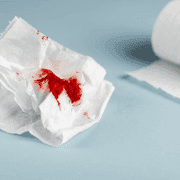Natural Remedies for Piles During Pregnancy
In This Article
Natural Remedies for Piles During Pregnancy
Elena
Updated on October 14, 2024
Medically verified by Dr. Arya
Fact checked by Dr. Fazeela

Proctology
5 min read
Piles, or hemorrhoids, are common during pregnancy due to increased pressure on the pelvic veins and hormonal changes.
They can cause discomfort, pain, and bleeding, which can be particularly challenging for pregnant women.
While medical treatments are available, many women prefer natural remedies to alleviate symptoms during pregnancy.
In this blog, Mykare Health will explore effective, safe, and simple remedies to manage piles while pregnant.
What Causes Piles During Pregnancy?
Several factors contribute to the development of piles during pregnancy
-
Increased Pressure: The growing uterus puts pressure on the pelvic veins, slowing blood flow and leading to the swelling of veins in the rectal area.
-
Hormonal Changes: Progesterone levels increase during pregnancy, relaxing the blood vessels and making them more prone to swelling.
-
Constipation: Hormonal changes can slow digestion, leading to constipation, which is a major cause of piles.
-
Weight Gain: Additional body weight during pregnancy adds pressure to the lower body, including the rectal veins.
-
Straining During Bowel Movements: Constipation can cause women to strain during bowel movements, further irritating the rectal veins.
Natural Remedies to Alleviate Piles During Pregnancy
Here are several natural remedies that can help relieve the discomfort and pain of piles during pregnancy:
1. Increase Fiber Intake
Constipation is one of the primary causes of piles, so adding more fiber to your diet can help. Fiber softens stools and promotes regular bowel movements, reducing the need to strain. Foods rich in fiber include
-
Whole grains (brown rice, oats)
-
Fruits (apples, berries, pears)
-
Vegetables (leafy greens, carrots)
-
Legumes (beans, lentils)
-
Aim for at least 25-30 grams of fiber daily.
2. Stay Hydrated
Drinking enough water is crucial for preventing constipation. Water helps soften stools, making them easier to pass and reducing the risk of straining. Pregnant women should aim to drink at least 8-10 glasses of water daily.
Herbal teas, such as ginger or chamomile, can also aid digestion and reduce inflammation, but always consult a healthcare professional before trying new herbal remedies during pregnancy.
3. Exercise Regularly
Moderate physical activity helps stimulate bowel function, reducing the chances of constipation. Simple exercises like walking, swimming, or prenatal yoga can improve circulation, prevent constipation, and reduce pressure on the veins. Aim for at least 30 minutes of exercise daily, but be sure to consult your doctor before starting any new workout routine.
4. Kegel Exercises
Kegel exercises strengthen the pelvic floor muscles, which can improve circulation in the rectal area. Stronger muscles can help prevent and reduce piles, as well as prepare your body for childbirth. To do Kegels, tighten the muscles you use to stop the flow of urine, hold for a few seconds, and then release. Repeat 10-15 times, several times a day.
5. Use Witch Hazel
Witch hazel is a natural astringent that helps reduce swelling and irritation caused by piles. Soaking a cotton pad in witch hazel and applying it to the affected area can provide immediate relief from itching and discomfort. Witch hazel is widely available in pharmacies and is considered safe during pregnancy when used externally.
 5 min read
5 min readDon't Ignore Bummy Pain: Could It Be Piles?
 7 min read
7 min readBlood In The Stool: A Sign You Shouldn’t Ignore
 6 min read
6 min readSitting All Day Wreaking Havoc? It Might Be Piles!
Get a Callback Now
6. Take Warm Sitz Baths
A warm sitz bath can provide soothing relief from the pain and inflammation of piles. Soak the affected area in warm (not hot) water for 10-15 minutes, 2-3 times a day. The warm water improves blood flow, reduces swelling, and eases discomfort. Adding Epsom salts to the water can enhance the anti-inflammatory effects.
7. Apply Cold Compresses
Cold compresses or ice packs can help reduce swelling and numb the pain associated with piles. Wrap an ice pack in a clean cloth and apply it to the affected area for 10-15 minutes. This method can be used several times a day for quick relief.
8. Use Coconut Oil
Coconut oil is known for its anti-inflammatory and soothing properties. Applying a small amount of coconut oil to the affected area can reduce irritation, itching, and swelling. Coconut oil also acts as a natural lubricant, which can ease bowel movements.
9. Avoid Sitting for Long Periods
Sitting for extended periods can increase pressure on the rectal veins, worsening piles. If possible, alternate between sitting, standing, and walking throughout the day. If your work requires you to sit for long hours, use a cushion or pillow to relieve pressure on the lower back and pelvic area.
10. Sleep on Your Side
Lying on your back can increase pressure on the rectal veins, leading to or worsening piles. To avoid this, sleep on your left side to reduce the strain on your pelvic area. Side-sleeping also improves blood circulation, which can help reduce swelling in the hemorrhoidal veins.
When to Seek Medical Help
While natural remedies can be effective in managing piles during pregnancy, there are times when medical intervention may be necessary. You should seek medical advice if
-
The piles become extremely painful or swollen.
-
You experience significant bleeding.
-
Over-the-counter remedies or natural methods are ineffective.
-
The condition worsens and interferes with daily activities.
-
Your healthcare provider may recommend additional treatments, such as stool softeners, topical ointments, or even surgery in rare cases.
Conclusion
Managing piles during pregnancy can be challenging, but with these natural remedies, you can reduce discomfort and improve your quality of life. It's essential to focus on preventing constipation by eating a fiber-rich diet, staying hydrated, and exercising regularly.
Additionally, using natural soothing agents like witch hazel, coconut oil, and cold compresses can provide relief. Always consult your healthcare provider before starting any new treatment, especially during pregnancy.
Fiber-Rich Diet: Increasing fiber intake can soften stools and prevent constipation, reducing the likelihood of piles.
Stay Hydrated: Drinking plenty of water promotes healthy digestion and helps prevent constipation.
Regular Exercise: Moderate physical activity, such as walking and yoga, can improve circulation and prevent constipation.
Kegel Exercises: Strengthening pelvic floor muscles can reduce pressure on the rectal veins and prevent piles.
Witch Hazel: Applying witch hazel to the affected area can soothe inflammation and provide relief from itching.
Warm Sitz Baths: Soaking in a warm bath can reduce inflammation and pain in the affected area.
Cold Compresses: Applying cold compresses can reduce swelling and numb pain caused by piles.
Coconut Oil: Using coconut oil can reduce irritation and itching while acting as a natural lubricant.
Avoid Prolonged Sitting: Changing positions frequently can relieve pressure on the rectal veins.
Side-Sleeping: Sleeping on your side can reduce strain on your pelvic area and improve circulation.
Source Links
Mayo Clinic
American Pregnancy Association
Healthline
BabyCenter



